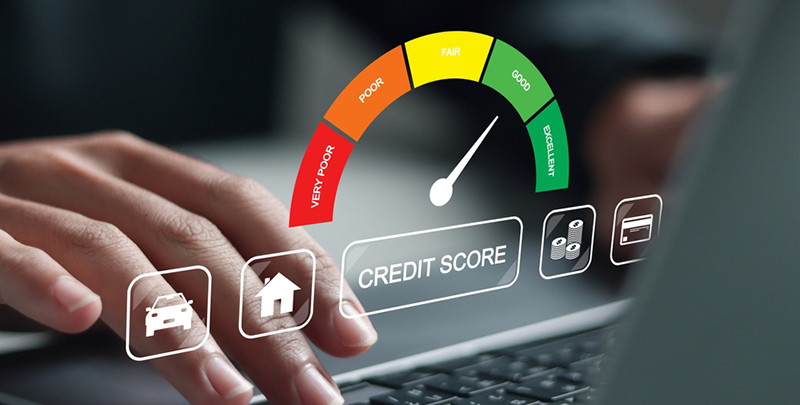- Open digital A/C
Explore 250+ banking services on Axis Mobile App
Scan to Download
- Current Account
- Pay
- Collect
- Trade
Services
Solution for Exporters
- Debt & Working Capital
24x7 Loans
For MSMEs with turnover up to ₹30 Cr
- Treasury
- Transact Digitally
- Home
- Blogs
- Credit Score Guide
- Difference between Cibil score and credit score

Credit Score
Difference between CIBIL score and credit score
When applying for loans or Credit Cards in India, you'll often hear financial institutions discussing your creditworthiness in terms of scores. The terms 'credit score' and 'CIBIL score' are frequently used interchangeably, confusing borrowers.
Understanding the difference between CIBIL score and credit score is crucial for managing your financial health effectively.
What is a CIBIL score?
The CIBIL score is a specific type of credit score provided by the Credit Information Bureau India Limited (CIBIL), one of India's four major credit bureaus. Ranging from 300 to 900, it quantifies your creditworthiness based on your credit history.
The CIBIL vs credit score distinction begins with the understanding that CIBIL is a specific brand of credit score in India.
The Reserve Bank of India (RBI) regulates CIBIL and collects credit-related information from banks and financial institutions. This data is compiled into your CIBIL report, from which your score is calculated.
Most Indian lenders consider a CIBIL score above 750 to be excellent, making you eligible for preferential interest rates and quicker loan approvals.
What is a credit score?
A credit score is a broader term referring to any numerical representation of creditworthiness generated by various credit bureaus. The difference between CIBIL and credit score lies in this specificity. While CIBIL is one provider, there are other bureaus in India, including Equifax, Experian, and CRIF High Mark, each producing their own version of credit scores.
These scores typically range from 300 to 900 (or occasionally 850, depending on the bureau) and are calculated using proprietary algorithms that analyse your credit behaviour. The credit score and CIBIL score difference is minimal in terms of purpose, but each bureau may weigh various factors differently in its calculations.
Key differences between CIBIL score and credit score
Both CIBIL and credit score are often used interchangeably, but there are major differences between credit and CIBIL scores. While the former encompasses the whole concept of credit score, the latter is specific to a recognised credit bureau.
The following table highlights the major differences between the CIBIL score and the credit score so that you can understand each better:
| Aspect | CIBIL score | Credit score |
|---|---|---|
| Meaning | CIBIL score meaning refers to the score calculated by TransUnion CIBIL. | The credit score is a measure of your creditworthiness. |
| Provider | The score is calculated specifically by TransUnion CIBIL. | The credit score can be calculated by any recognised credit bureau. |
| Popularity in India | The CIBIL score is the most widely recognised and used by Indian lenders. | While other bureaus are gaining recognition, they are less common than TransUnion CIBIL. |
| Access | One free credit report is available annually. | Each credit bureau also offers one free report annually. |
| Calculation method | There is a fixed method of CIBIL score calculation based on CIBIL's proprietary algorithm. | Each bureau has its own calculation methodology. No standard methodology or formula is followed across bureaus. |
Understanding the CIBIL score vs credit score distinction helps you recognise that while they serve the same purpose, they come from different sources. This CIBIL score and credit score difference impacts how you monitor your credit health.
What is interesting to note is that the scores across bureaus differ. Your CIBIL score may differ from the credit score types calculated by other bureaus in India. However, the interpretation of the score usually remains the same even if the absolute numbers are different. For instance, if a CIBIL score of 710 is good, a credit score of 700 calculated by another bureau would also be considered good.
Factors affecting both CIBIL score and credit score
While the credit vs CIBIL score terminology differs, the factors affecting credit score remain primarily similar.
| Factor | Weight | Impact |
|---|---|---|
| Payment history | 35% | A record of on-time payments significantly boosts your score. |
| Credit utilisation | 30% | Keeping usage below 30% of available credit is ideal. |
| Length of credit history | 15% | Longer credit histories demonstrate reliability. |
| Credit mix | 10% | Having diverse credit types (loans, Credit Cards) shows balanced management. |
| New credit inquiries | 10% | Submitting too many applications in a brief period can lower your score. |
Conclusion
So, what is the difference between CIBIL score and credit score? The question essentially boils down to specificity—CIBIL is one brand of credit score in India, while a credit score is a general term that encompasses scores from all bureaus.
Regardless of what is the difference between credit score and CIBIL score, maintaining good credit habits is essential.
Axis Bank offers Personal Loans up to ₹40 lakhs with flexible tenures of 12–84 months and interest rates starting from 11.25% p.a. No collateral is required, and approvals are quick with minimal documentation. Salaried individuals aged 21–60 with a minimum monthly income of ₹15,000 (for existing customers) or ₹25,000 (for new customers) are eligible.
Also Read: Top 6 tips to build Credit Score from scratch
FAQs
How long does it take to improve a CIBIL score?
Improving your CIBIL score is not an overnight process. Typically, it takes 3–6 months of consistent positive credit behaviour to see noticeable improvements. Significant adverse events, such as defaults, may take longer—sometimes up to 2 or 3 years—to overcome. Focus on making regular payments, reducing outstanding debt, and avoiding new credit applications during this period of improvement.
Which score do banks and lenders check, CIBIL or credit score?
Most Indian banks and financial institutions primarily check your CIBIL score when evaluating loan applications. However, some lenders may check credit scores from multiple bureaus to get a comprehensive view of your creditworthiness. The credit score vs CIBIL score choice varies by institution, with some newer or international lenders placing equal importance on reports from other bureaus like Experian or Equifax.
Which credit score is most suitable for loan approval?
For most Indian lenders, a CIBIL score of 750 or above is considered excellent, significantly increasing your chances of loan approval with favourable terms. However, the specific threshold varies by lender and loan type. While CIBIL is most widely recognised, maintaining good scores across all bureaus ensures you are well-positioned regardless of which credit vs CIBIL score metric a particular lender prioritises.
Disclaimer: This article is intended solely for informational purposes. The views expressed in this article are personal. Axis Bank and/or the author shall not be liable for any direct or indirect loss or liability incurred by the reader arising from reliance on the content herein. Readers are advised to consult a qualified financial advisor before making any financial decisions. Axis Bank does not endorse or guarantee the accuracy of any third-party content or links included in this article.
Table of Contents
Related Services
How to increase your CIBIL score?
Know how to increase CIBIL score and improve your credit...
CIBIL Score Ranges
Enhance your credit scores by understanding the CIBIL score ranges.
Difference between CIBIL score and credit score
Understand the difference between CIBIL score and credit score clearly.
Experian vs CIBIL score
Explore Experian vs CIBIL, the two major credit bureaus.
Learning Hub
Look through our knowledge section for helpful blogs and articles.













